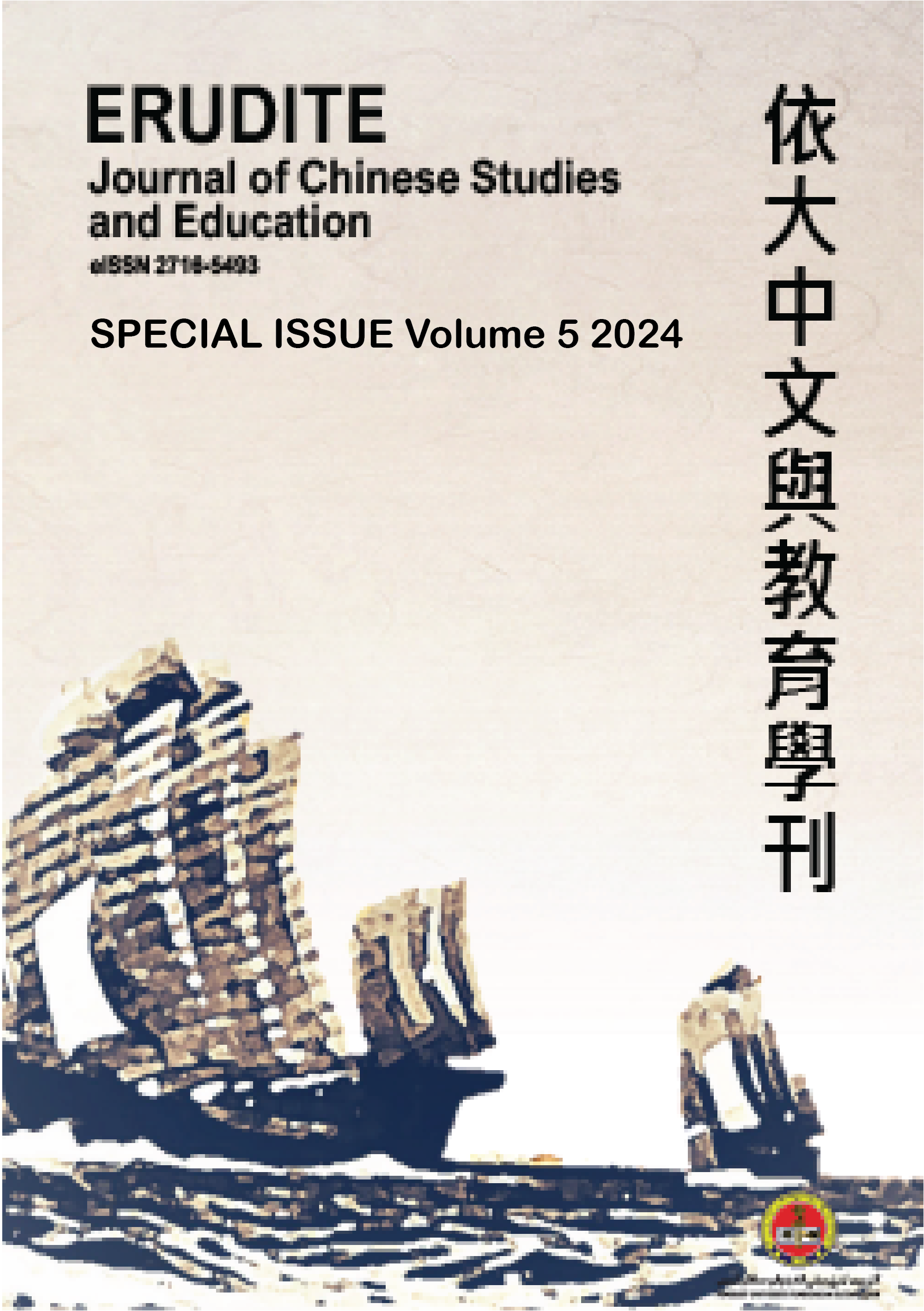中国传统思想的教育学研究方法之探讨: 以老庄哲学研究为讨论核心
An Exploration of Pedagogical Research Methods in Traditional Chinese Thought: The Study of Lao-Zhuang Philosophy as the Core of Discussion
DOI:
https://doi.org/10.37134/erudite.vol5.sp.3.2024Keywords:
方法论, 老庄教育哲学, 教育学, 道家Abstract
本研究以“老庄教育哲学”为研究主题的论文为讨论核心,试图分析中国传统思想的教育学研究方法,并试着厘清中国传统思想的教育研究之“教育史研究”及“教育哲学研究”的界线为何。研究发现,目前与教育研究主题相关的老庄研究成果,大致有两种类型,其一,为以教育学相关概念为主要脉络及分析视框来进行老庄思想研究,优点在于能凸显教育的价值与特色,但缺点是这样的研究不一定能呈现传统思想的完整性。其二,为以老庄思想为核心,再诠释其教育蕴义的教育哲学研究,优点为能突现思想的完整性,避免诠释上的断章取义,但缺点是许多论文变成以传统思想的义理诠释为主,教育衍释的部分较少且不够有系统性。 整体而言,中国传统思想的教育研究,大多依循中国哲学研究的三阶段来进行,研究方法的运用与说明普遍较少。若该研究本身为“思想本身的诠释”研究,则属“教育哲学”研究,若偏重传统思想在不同时代的思想交涉,或是某思想与当时政治社会脉络的意义探究,则属“教育史”研究范围,因此,现行老庄哲学的教育研究,应可归纳为“教育哲学”研究。
This study takes “Lao Zhuang’s Philosophy of Education” as the core of discussion, and tries to analyze the pedagogical research methodology of traditional Chinese thought, as well as to clarify the boundaries between the “study of history of education” and the “study of philosophy of education” in the study of traditional Chinese thought in education. It is found that there are two types of Lao-Zhuang's research results related to the theme of education research. First, the research on Lao-Zhuang’s thought is conducted with the concepts related to pedagogy as the main vein and analytical framework, which has the advantage of highlighting the value and characteristics of education, but the disadvantage is that this kind of research does not necessarily present the completeness of the traditional thought. The second is to take Lao-Zhuang’s thought as the core and then interpret its educational implications in the study of philosophy of education. The advantage is that it can highlight the completeness of the thought and avoid the interpretation of the meaning out of context, but the disadvantage is that many papers become mainly based on the interpretation of the meaning of the traditional thought, and the part of the educational derivation is relatively small and not systematic enough. On the whole, most of the educational research on traditional Chinese thought follows the three stages of Chinese philosophical research, and the application and explanation of research methodology is generally rare. If the study itself is a study of “the interpretation of thought itself”, then it belongs to the study of “philosophy of education”. If the study emphasizes on the ideological interactions of traditional thought in different times, or the exploration of the meaning of a certain thought in relation to the political and social context of the time, then it belongs to the study of “history of education”, so the study of the education of the current philosophy of Lao and Zhuang can be categorized as a study of “philosophy of education”.
Keywords: Methodology, Lao-Zhuang's Philosophy of Education, Pedagogy, Daoism
Downloads
References
一、论著
王邦雄等(2010)。《中国哲学史(上)(下)》。台北:里仁。
任时先(1993)。《中国教育思想史》。台北:台湾商务印书馆。
劳思光(2005)。《新编中国哲学史(一)》。台北:三民。
林秀珍(2020)。《庄子哲学的教育诠释》。台北:师大书苑。
林秀珍(2015)。《老子哲学与教育》。台北:师大书苑。
林逢祺、洪仁进(2014)。《教育哲学:方法篇》。台北:学富。
杨深坑(2002)。《科学理论与教育学发展》。台北:心理。
贾馥茗(2003)。《教育哲学(初版七刷)》。台北:三民。
黄俊杰(2003)。《历史知识与历史思考》。台北:国立台湾大学出版中心。
Knight, G. R. (2010)。《教育哲学导论(简成熙,译)》。台北:五南。(原著出版于2008年)
二、学位论文
林君廷(2016)。《老子的不争哲学及其对教育竞争之启示》。台北:国立台湾师范大学教育学系硕士论文。
黄睿(2021)。《<庄子>教育哲学研究》。新北:辅仁大学哲学系博士论文。
三、期刊论文
李彦仪(2019)。<《荀子》礼乐思想及其对当代品德教育的启示>。《鹅湖月刊》,533,43-52。
何俊青(1996)。<老子的教育思想在现代教育的意义>。《哲学与文化》,23(11),2177-2187。
陈荣灼(2021)。<道家与晚期梅露‧庞蒂身体现象学之滙通>。《鹅湖月刊》,66,36-58。
陈玲玲(2020)。<《庄子》“不材之木”隐喻之教学反思>。《中等教育》,71(3),81-93。
林秀珍(1999)。<教育理论本土化的省思>。《教育研究集刊》,42,1-15。
周愚文(2003)。<近五十年我国教育史学门研究之探讨:1949-2002>。《师大学报》,48(1),1-14。
曾暐杰(2015)。<礼导形‧形入心‧心正身‧身心合——论荀子的身体观及其修养论中的身心关系>。《汉学研究》,35(3),2-30。
Barnacle, R.(2004). Reflection on Lived Experience in Educational Research. Educational Philosophy and Theory, 36(1), 57-67.
Paterson M., etc.,(2005). Using Hermeneutics as a Qualitative Research Approach in Professional Practice. The Qualitative Report, 10(2), 339-357.
Shun, Kwong-loi.(2016). Methodological Reflections on the Study of Chinese Thought. In The Bloomsbury Research Handbook of Chinese Philosophy Methodologies, edited by Sor-hoon Tan. New York: Bloomsbury, 57-74.
Downloads
Published
Issue
Section
License
Copyright (c) 2024 Huang Chien-Lun

This work is licensed under a Creative Commons Attribution-NonCommercial-ShareAlike 4.0 International License.





